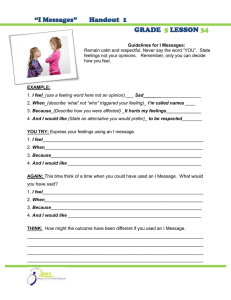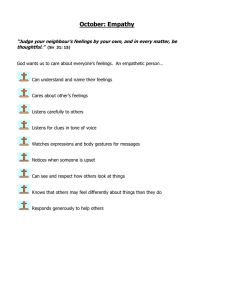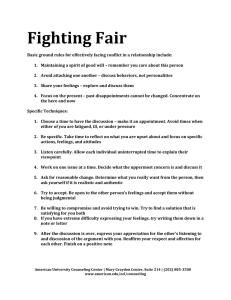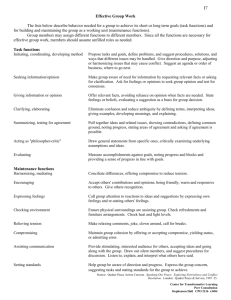Tips For Taking Care of Yourself During Stressful Times
advertisement
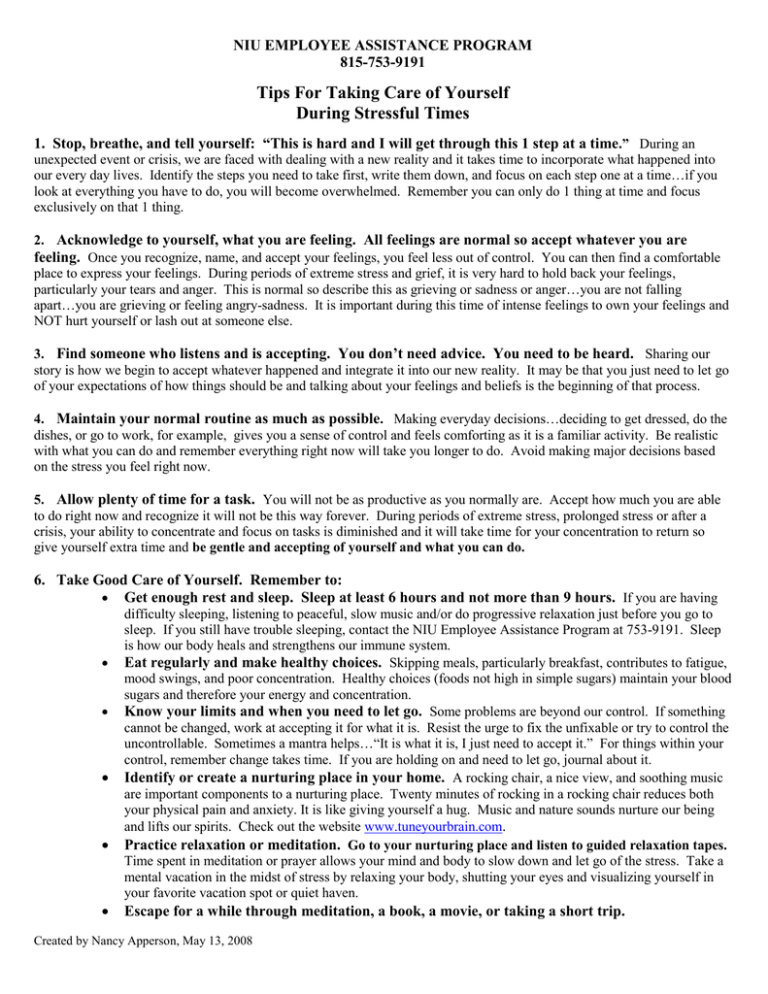
NIU EMPLOYEE ASSISTANCE PROGRAM 815-753-9191 Tips For Taking Care of Yourself During Stressful Times 1. Stop, breathe, and tell yourself: “This is hard and I will get through this 1 step at a time.” During an unexpected event or crisis, we are faced with dealing with a new reality and it takes time to incorporate what happened into our every day lives. Identify the steps you need to take first, write them down, and focus on each step one at a time…if you look at everything you have to do, you will become overwhelmed. Remember you can only do 1 thing at time and focus exclusively on that 1 thing. 2. Acknowledge to yourself, what you are feeling. All feelings are normal so accept whatever you are feeling. Once you recognize, name, and accept your feelings, you feel less out of control. You can then find a comfortable place to express your feelings. During periods of extreme stress and grief, it is very hard to hold back your feelings, particularly your tears and anger. This is normal so describe this as grieving or sadness or anger…you are not falling apart…you are grieving or feeling angry-sadness. It is important during this time of intense feelings to own your feelings and NOT hurt yourself or lash out at someone else. 3. Find someone who listens and is accepting. You don’t need advice. You need to be heard. Sharing our story is how we begin to accept whatever happened and integrate it into our new reality. It may be that you just need to let go of your expectations of how things should be and talking about your feelings and beliefs is the beginning of that process. 4. Maintain your normal routine as much as possible. Making everyday decisions…deciding to get dressed, do the dishes, or go to work, for example, gives you a sense of control and feels comforting as it is a familiar activity. Be realistic with what you can do and remember everything right now will take you longer to do. Avoid making major decisions based on the stress you feel right now. 5. Allow plenty of time for a task. You will not be as productive as you normally are. Accept how much you are able to do right now and recognize it will not be this way forever. During periods of extreme stress, prolonged stress or after a crisis, your ability to concentrate and focus on tasks is diminished and it will take time for your concentration to return so give yourself extra time and be gentle and accepting of yourself and what you can do. 6. Take Good Care of Yourself. Remember to: Get enough rest and sleep. Sleep at least 6 hours and not more than 9 hours. If you are having difficulty sleeping, listening to peaceful, slow music and/or do progressive relaxation just before you go to sleep. If you still have trouble sleeping, contact the NIU Employee Assistance Program at 753-9191. Sleep is how our body heals and strengthens our immune system. Eat regularly and make healthy choices. Skipping meals, particularly breakfast, contributes to fatigue, mood swings, and poor concentration. Healthy choices (foods not high in simple sugars) maintain your blood sugars and therefore your energy and concentration. Know your limits and when you need to let go. Some problems are beyond our control. If something cannot be changed, work at accepting it for what it is. Resist the urge to fix the unfixable or try to control the uncontrollable. Sometimes a mantra helps…“It is what it is, I just need to accept it.” For things within your control, remember change takes time. If you are holding on and need to let go, journal about it. Identify or create a nurturing place in your home. A rocking chair, a nice view, and soothing music are important components to a nurturing place. Twenty minutes of rocking in a rocking chair reduces both your physical pain and anxiety. It is like giving yourself a hug. Music and nature sounds nurture our being and lifts our spirits. Check out the website www.tuneyourbrain.com. Practice relaxation or meditation. Go to your nurturing place and listen to guided relaxation tapes. Time spent in meditation or prayer allows your mind and body to slow down and let go of the stress. Take a mental vacation in the midst of stress by relaxing your body, shutting your eyes and visualizing yourself in your favorite vacation spot or quiet haven. Escape for a while through meditation, a book, a movie, or taking a short trip. Created by Nancy Apperson, May 13, 2008
